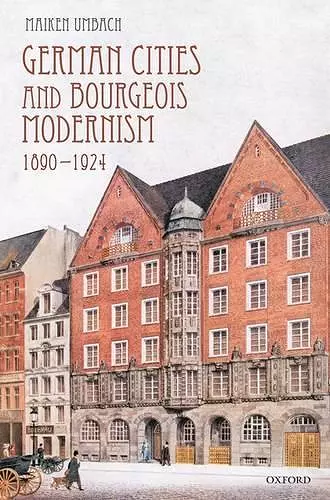German Cities and Bourgeois Modernism, 1890-1924
Format:Hardback
Publisher:Oxford University Press
Published:25th Jun '09
Currently unavailable, and unfortunately no date known when it will be back

This is a study of a distinctive brand of modernism that first emerged in late nineteenth-century Germany and remained influential throughout the inter-war years and beyond. Its supporters saw themselves as a new elite, ideally placed to tackle the many challenges facing the young and rapidly industrializing German nation-state. They defined themselves as bourgeois, and acted as self-appointed champions of a modern consciousness. Focusing on figures such as Hermann Muthesius, Fritz Schumacher, and Karl-Ernst Osthaus, and the activities of the Deutscher Werkbund and other networks of bourgeois designers, writers, and 'experts', this book shows how bourgeois modernism shaped the infrastructure of social and political life in early twentieth-century Germany. Bourgeois modernism exercised its power not so much in the realm of ideas, but by transforming the physical environment of German cities, from domestic interiors, via consumer objects, to urban and regional planning. Drawing on a detailed analysis of key material sites of bourgeois modernism, and interpreting them in conjunction with written sources, this study offers new insights into the history of the bourgeois mindset and its operations in the private and public realms. Thematic chapters examine leitmotifs such as the sense of locality and place, the sense of history and time, and the sense of nature and culture. Yet for all its self-conscious progressivism, German bourgeois modernism was not an inevitable precursor of neo-liberal global capitalism. It remained a hotly contested historical construct, which was constantly re-defined in different geographical and political settings.
A sophisticated re-evaluation of German bourgeois modernism through the lens of material culture. * Sasha Disko, European History Quarterly. *
Umbach's arguments will be of considerable interest to German historians and to architectural, urban, and cultural historians ... deserves a wide audience. * Jeffry M. Diefendorf, Central European History *
this study of the material culture of German modernism clearly provides readers with a scintillating exercise in environmental and aesthetic history. * Michael Biddiss, History *
Maiken Umbach has written a brilliant, provocative and engaging study of bourgeois modernism that will make a substantial impact upon the scholarship of modern German history and culture. * Carolyn Kay, English Historical Review *
ISBN: 9780199557394
Dimensions: 240mm x 161mm x 17mm
Weight: 608g
268 pages